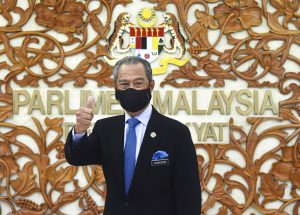Malaysia’s Prime Minister Muhyiddin Yassin has squeaked through his latest political challenge, as the parliament voted to approve his government’s proposed budget for 2021.
In order to gain the support of skeptical opposition lawmakers, Finance Minister Zafrul Aziz added some additional sprinkles of coronavirus stimulus to the 322.5 billion ringgit ($79 billion) budget. He described it as “a COVID-19 budget, a budget for survival and resilience.”
The November 26 vote loomed as a virtual vote of confidence in Muhyiddin’s unelected government, which maneuvered itself into power after precipitating the collapse of the reformist Pakatan Harapan (PH) coalition in February of this year. Since then, Muhyiddin has limped along with a two-seat parliamentary majority, besieged by challenges from within and without.
In September, Malaysia’s perennial opposition leader Anwar Ibrahim challenged Muhyiddin’s leadership by announcing that he had majority support to form a new government with defections from Muhyiddin’s Perikatan Nasional (PN) coalition. The Malaysian leader also continues to face pressures from within his coalition, particularly from the dominant United Malays National Organization (UMNO), some of whose members demanded changes to the budget before they would vote for it.
Had the budget failed to pass, it would likely have prompted fresh calls for Muhyiddin to resign or call a snap general election, a perilous undertaking with the pandemic still raging.
The 2021 budget is Malaysia’s biggest ever, filled with new infrastructure spending pledges and support for businesses hit hard by the COVID-19 pandemic. But opposition lawmakers and members of Muhyiddin’s governing coalition had warned that they might reject the budget, citing insufficient funding to fight a surge in coronavirus cases. As of November 26, Malaysia had recorded 935 new infections, bringing the country’s total to 60,752, currently the fourth-highest total in Southeast Asia.
During a parliamentary debate on November 9, Anwar said that the budget had a lopsided focus on infrastructure projects at the expense of improving access to education, or addressing the needs of people who have lost jobs and livelihoods due to COVID-19. “Unless this budget 2021 truly serves to help the people, we are not going to support it,” he said.
The budget was opposed for other reasons, including its allocation of 85.5 million ringgit ($20.7 million) to the Special Affairs Department (JASA), a body that was often described as UMNO’s de facto propaganda arm.
In the end, the opposition agreed to approve the budget after some tweaks. Among the list of changes were the addition of cash payments for frontline workers, farmers, and fishermen, as well as 50 million ringgit ($12.3 million) to fight COVID-19 in the state of Sabah, where infections spiked during state elections in late September.
While Muhyiddin has survived for now, a second round of debate on the budget begins next week, when the budget for each ministry will be scrutinized in detail by parliamentary committees. Under Malaysian law, the bill will then be returned to parliament for a third and final vote before it becomes law.
Anwar has promised that his party will oppose any changes it things should be made. “There is no guarantee that it will get approved,” he told reporters, adding “we will certainly choose to reject and call for revision where deemed necessary.”
Ahmad Fauzi Abdul Hamid, a political science professor at Malaysia’s University of Science, told The Associated Press that the government was temporarily secure, but would “continue to have to fight from bill to bill as it survives on a slender majority and on the goodwill of bigger parties in the [governing] coalition.” This weakness suggests that the political uncertainty of the past year will persist as long as Muhyiddin’s government lacks an electoral mandate.

































